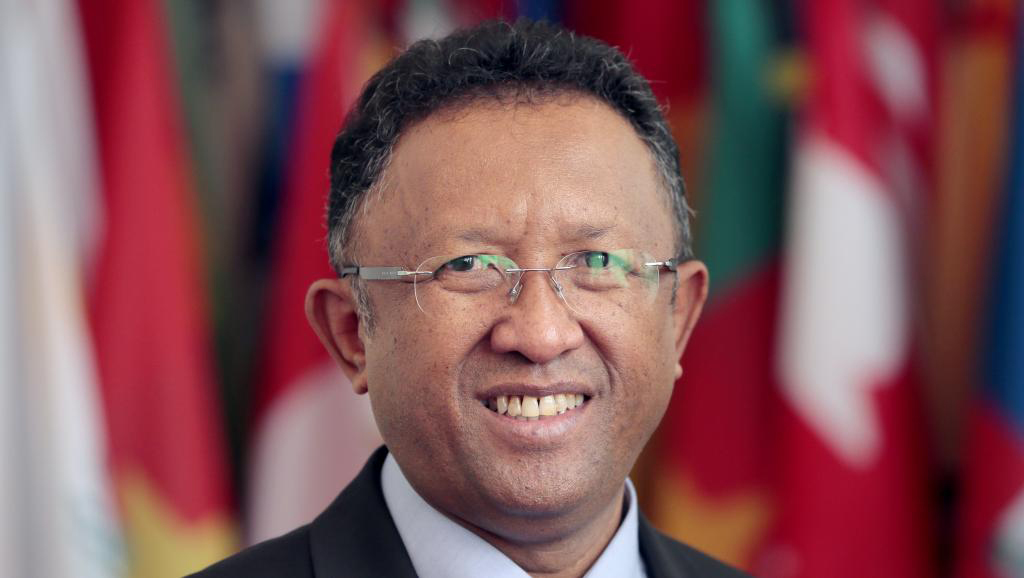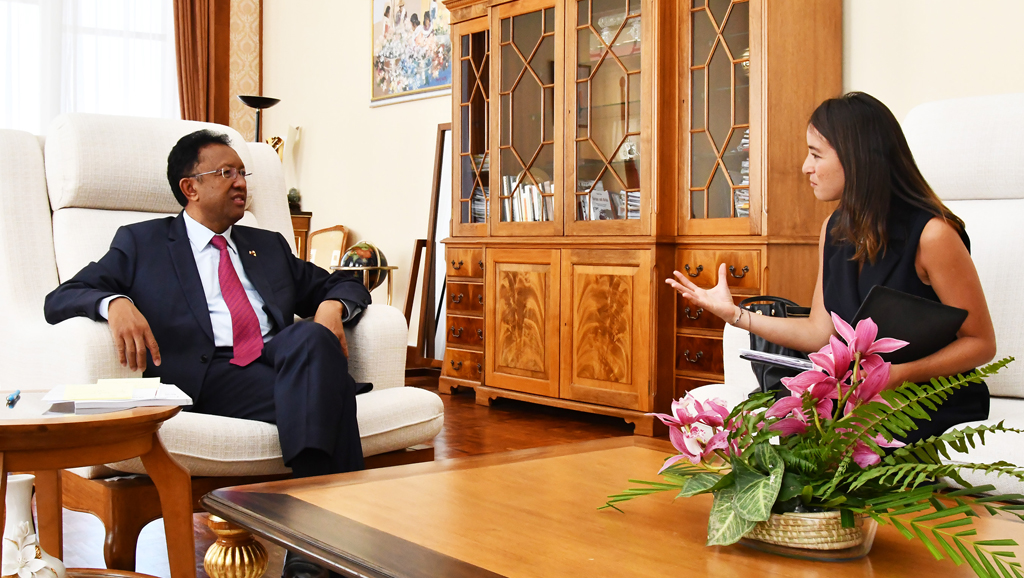
09 Jul Interview with President of Madagascar , H.E Monsieur Hery Rajaonarimampianina
Since taking office in 2014, you have initiated governance reforms aimed at stabilizing institutions and reducing poverty in the country. In this regard, what is your analysis of the evolution of the political and socio-economic situation in Madagascar since you came to power and what are the expected results and objectives for the rest of your mandate?
Firstly, I want to thank you for being here. This country comes from afar. When I arrived in January 2014, according to the backers’ statistics, the poverty and extreme poverty rate was 92%. The country has been sanctioned politically, diplomatically, financially and economically. You can therefore guess where we started off. If we go further, we have lived 55 years of political and economical crisis which has only made the country poorer.
I had to roll out urgency strategies and politics, as well as politics that would allow an institutional, political and economical stability. My strategy is to have a long term vision that I started with the National Development Plan for 4 years. Which I am pursuing now with a long term vision in 2030: Fisandratana 2030. This word means economical and financial emergence and the « rebirth » aspect on the minds, mentalities and attitudes to have in order to accomplish this Emergence.
I established activities based on structuring projects in various sectors: energy, infrastructure, tourism… There are many sectors but the most important is my project in agriculture because it involves 75-80% of the population and remains an old and basic sector. We need to increase productivity in this sector. By increasing productivity, we improve the population’ conditions of life. The state is giving various investments in this sector: infrastructure, dams, seeds, fertilizers, and various materials (small or big like tractors).
I have worked on different sectors to increase economic growth from almost 3 to 5%. The objective is to go further to 7% by 2030, probably before. By 2030, the objective is to more than double GDP. We can see results in energy because I rolled out the energy transition. There are some roads, harbors, airports like in Ivato. This will contribute to the increase of tourism and eco-tourism. Like you said before, our objective is to become the champion of the blue economy because our marine surface is double our land surface with a lot of wealth in it. We covet to be the Indian Ocean’s granary and a country which will attract as many tourists as possible because we represent 5% of the global biodiversity. To sum up, even though Madagascar has come from afar, it is today a country of opportunity for investors.

According to you, 2018 is a crucial year, which is not only the year of elections but also the year of the country’s “emergence”. In this respect, you presented the “Fisandratana 2030” plan (emergence and renaissance in Malagasy), a strategy that extends the National Development Plan (PND 2015-2019). This is a real long-term vision for the country in all sectors with the goal of achieving sustainable economic growth that doubles GDP by 2030. Could you tell us more? What measures have been put in place and what results do you expect by 2030?
There a lot of measures in different sectors. I’m going to talk about the social (education and health). We opened many new schools and classrooms, Primary Health Care Centers that were closed down during the crisis, because they are important. We are establishing social protection projects to stimulate mothers and children towards health but also incite children to go to school.
On the economical aspect, we have rolled measures out that are already taking place to encourage investors in each sector. We have improved the business environment in Madagascar. We have also established new structures like the Special Economic Zone and the Agricultural Investment Zone (like the law about industrialization). All of this contributes to an investment development.
The objective of all of this is to create jobs, increase the shared value and increase and improve production to increase the exportation’s capacity. The markets are here: Indian Ocean, COMESA, and SADEC, African market in general and global market. We have textile markets like AGOA with the US.
The relaunch of bilateral relations with the United States has been marked in particular by the lifting of restrictions on direct aid to Madagascar by the US Government, the reintegration of Madagascar to the Africa Growth and Opportunity Act (AGOA) and the US H2 visa for temporary workers in the United States. Can you tell us about the importance and the impact of this strengthening of relations between the two countries? Are there opportunities for further rapprochement with the United States in the future?
USA is a big country for Madagascar and therefore a great market and a great partner as well. US-Aids are present and rest on different sectors: social for example. The AGOA market is expanding and we were able to increase the exportations these last two years towards the US. Free zones work with the AGOA to export towards the US which results in job and value creations and therefore value exportations. US-Aids work in social but also different sectors like the environment and some economic sectors. Relationships are good and will be even more developed in the future.
You emphasized the importance of improving the country’s business climate to attract foreign investors, which is a priority for Madagascar’s financial partners. What reforms has the government taken to attract new investors? What are your forecasts for FDI growth in 2018? What are the sectors prioritized by investors?
You should invest in this country because every day we are rolling out an environment favourable and suitable for these investments. It’s not over yet, but we are making efforts.
Secondly, Madagascar is a country that has a lot of wealth: mining, marine and most of all human resources. More than half of the population is young, which is a great resource for the country.
What is interesting to say is that Madagascar is an island which is safe and quiet. And I think it’s important. Even if once or twice there can be some political and social turbulence… I am convinced that Madagascar is a country that is safe and quiet. Furthermore, Madagascar is at the intersection of various countries and continents: Africa, Arabia, and Asia. And it is the intersection of cultures: oriental from east and African. All of this is comprise the wealth of Madagascar.
In view of the elections that will take place at the end of this year, what legacy would you like to leave to the country and to your citizens?
I wish for a peaceful environment for the elections. The legacy that I wish to leave is this democratic culture for the elections. I’m a president which is getting out of an electoral process that is transparent and credible. I wish to continue this very same process, if not better, this year and for the following years. It is the best legacy that I can leave to the population and young generations. The way to democracy is not easy, it’s fragile but we need to strengthen this process and keep in touch with the people. The president has to drive all these reforms.
What are your expectations for these elections?
As I said, I want peaceful, transparent and credible elections. If we can roll that out, it will be a successful gamble.

